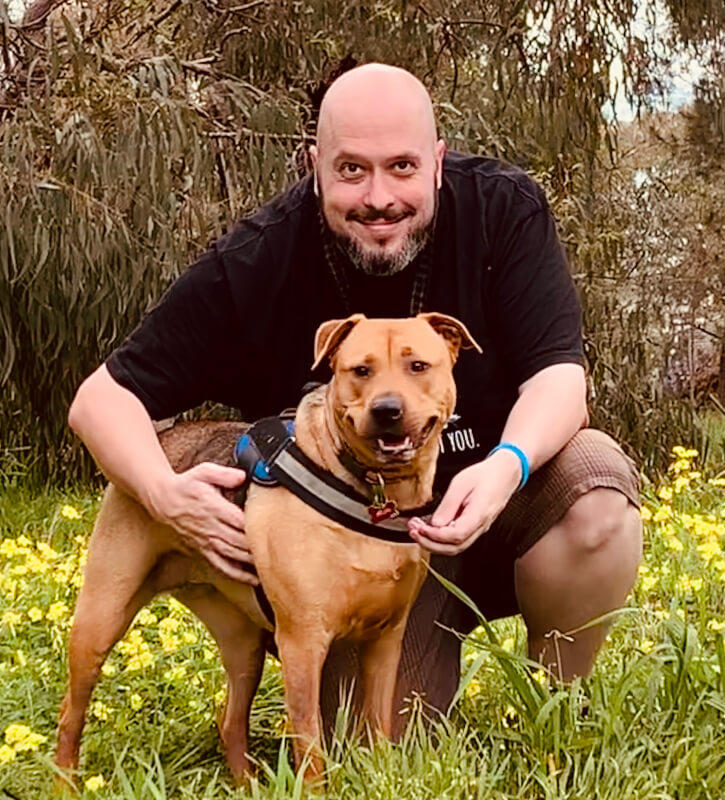Dave Peters
Lived Experience Ambassador
 Q: Who is Dave Peters? Where do you live, what do you do (work or otherwise), any quirky facts about you?
Q: Who is Dave Peters? Where do you live, what do you do (work or otherwise), any quirky facts about you?
A: I live in Melbourne and have a range of jobs, from guest speaking at Monash University, Melbourne University, Australian Catholic University and Swinburne University, talking to various allied health students about my experience of mental health and recovery, as well as running several workshops designed to increase awareness, normalise and encourage help seeking behaviour. My primary work is now as a research assistant at the Brotherhood of St Laurence working on a massive evaluation of the NDIS planning pathways and participant experiences.
I’m a huge dog lover and after owning several dogs in my lifetime, I decided to get some unconditional love in my life and adopted a puppy back in November 2017. She’s now 32kg and needing a huge amount of attention to prevent wanton destruction of my home! She keeps me company and makes sure I get out to the park for a couple of hours a day, which is extremely challenging in the middle of winter after a long day at work. In my spare (HA!) time, I’m an avid reader and love to read Harry Potter fan fiction, as well as some really unhealthy binge-watching of TV series on Netflix.
Q: What is your perspective on the role of Equally Well and what do you hope you are able to bring to the project?
A: I believe Equally Well is positioned very well to lead a change in attitudes and to help lead by example in spreading the word and sharing the great examples of interventions/good practice from the services across Australia. As part of a strategic plan for addressing the physical health of people living with chronic mental illness, services and agencies ranging from state government to community organisations have committed to making the physical health a priority for people living with mental illness.
Primarily, I believe my role as someone with a lived experience is to provide input from a user perspective on the impact that research, information and strategies will have on people in my position. I hope that by learning as much as I can and increasing my own awareness and understanding, I will be able to spread awareness about the issues and possible actions we can take to address the mortality gap, primarily through addressing the mainly preventable diseases contributing to that gap.
Q: Who have you enjoyed meeting/working with so far? Any highlights?
A: Over the past 18 months, I’ve met so many wonderful and passionate members of both the various working groups and committees, but having an opportunity to work alongside people who are so prominent in the mental health sector has been amazing. Russell Roberts, Lucy Brogden, Kim Ryan and Chris Maylea have all had a huge impact on my experience and input into the ongoing work of Equally Well.
Q: Could you please share any initiatives, resources, events, projects, programs (across any organisation) that you have come across, that highlight good things happening in the area of improving the physical health of people living with mental illness?
A: Given the difficult situation with service provision in mental health services in Victoria over the course of the NDIS roll out, it has been extremely difficult for services to offer any supports even from their core business of coaching and talking therapies in the community. There have been several articles in recent months from Beyond Blue, Black Dog Institute, ABC, Royal Australian College of General Practitioners and the Heart Foundation about the benefits of exercise for the treatment and prevention of depression, and last year there was a report on Australia’s performance in tackling the higher risk factors and incidence of preventable chronic physical disease amongst Australians with mental health conditions. Most recently, The Lancet published a detailed report on these issues with some great publicity from one of our Equally Well Ambassadors, Dr Simon Rosenbaum. In November 2018, I presented at the NDIS and Mental Health conference about this issue, proposing that participants of the NDIS with a psychosocial disability should automatically be granted access to supports from the “Health and Wellbeing” range of NDIS funded services to facilitate and encourage action towards preventing these physical health conditions.
More recently, I was co-presenting at the Mental Health Services Conference (TheMHS) with Russell Roberts from Equally Well Australia as well as Rachel Kapeli from the Te Pou group in New Zealand.
Q: What are some of the challenges to the Equally Well achieving its objectives?
A: I think Equally Well has an incredibly complex task ahead to try and unify the efforts of hundreds of service providers around Australia. Equally Well has done some incredible work so far, getting agreement in principle on so many points from dozens of organisations and leading bodies around Australia. Unfortunately, the current funding models operating throughout Australia means that each organisation has different reporting requirements on the outcomes required by the funding body. Very broadly, each service provider has agreed to follow the elements in The Fifth National Mental Health and Suicide Prevention Plan, but until the separate funding authorities make the issue of physical health outcomes a requirement of the funding, or begin to offer specific funding or pilot programs to tackle the issues identified, Equally Well has a difficult road ahead.
In a very general sense, each service provider already signed on has agreed to make this issue a priority in their practice. Unfortunately, until there is specific funding earmarked for a service specifically to target the issues of physical health amongst people living with mental illness, I don’t see how things will progress from the status quo.
The work being done by Equally Well on raising awareness and showing/publicising resources already available will go a long way in promoting real change.

